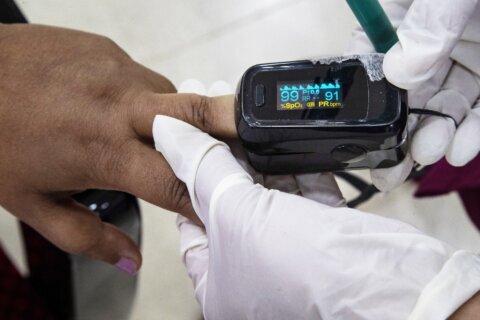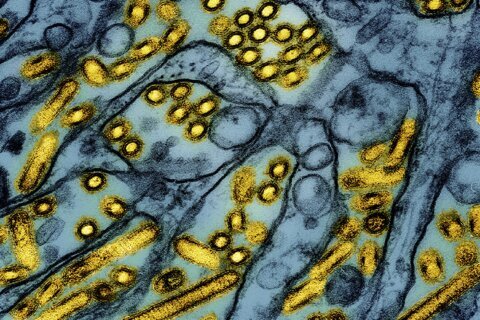(CNN) — Teens who spend lots of time on social media have complained of feeling like they can’t pay attention to more important things like homework or time with loved ones.
A new study has possibly captured that objectively, finding that for teens diagnosed with internet addiction, signaling between brain regions important for controlling attention, working memory and more was disrupted.
The findings are from a review, published Tuesday in the journal PLOS Mental Health, of 12 neuroimaging studies of a few hundred adolescents ages 10 to 19 between 2013 and 2022.
“The behavioural addiction brought on by excessive internet use has become a rising source of concern since the last decade,” the authors wrote in the study.
The criteria for clinical diagnosis of internet addiction in the included studies were “one’s persistent preoccupation with the internet, withdrawal symptoms when away from the internet, and sacrificing relationships (for) time to spend on the internet over an extended period of time (e.g., 12 months),” said Max Chang, first author of the study and outreach case manager at the nonprofit Peninsula Family Service in San Francisco, via email. “The pattern of behaviour results in significant impairment or distress in the individual’s life.”
Given the changing state of adolescent brains compared with adults, the authors felt understanding the impacts of internet addiction on the teenage participants’ brains was vital.
When participants clinically diagnosed with internet addiction engaged in activities governed by the brain’s executive function network — behaviors requiring attention, planning, decision-making and impulse control — those brain regions showed substantial disruption in their ability to work together, compared to those in peers without internet addiction. The authors think such signaling changes could suggest these behaviors can become more difficult to perform, potentially influencing development and well-being.
“While this paper presents a straightforward systematic review suggesting that there are associations between functional connectivity in the brain and internet ‘addiction,’ there are a number of fundamental limitations to be aware of that are critical to any interpretation,” Dr. David Ellis, a behavioral scientist at the University of Bath’s Institute for Digital Security and Behaviour, said in a news release.
“Cause and effect cannot be drawn from these studies,” said Ellis, who wasn’t involved in the study. “Second, the focus on functional connectivity comes at the expense of any critique about the key measure of interest. Specifically, internet ‘addiction,’ which was initially conjured up by (psychiatrist) Ivan K. Goldberg in 1995 as a joke.
“Today, the conceptualisation and measurement of internet ‘addiction’ is neither universally accepted and certainly not diagnosable using the survey instruments used in the studies included as part of the review,” Ellis added. “Similarly, the enormity of activities that the internet allows for immediately makes this definition somewhat redundant.”
In the United States, internet addiction isn’t included in the DSM-V — the Diagnostic and Statistical Manual of Mental Disorders, the standard classification of mental disorders used by mental health professionals in the US. It does, however, list internet gaming disorder. All the studies the authors reviewed were all conducted in Asia and consisted of mostly male participants. China was the first country to declare internet addiction a “public health crisis.”
“Such definitions, despite being widely critiqued, also have a tendency to move the focus away from genuine online harm and towards a conclusion that suggests the removal of technology from people’s lives will be helpful,” Ellis said. “Solid evidence to suggest that removing the internet brings any tangible benefits has not been forthcoming.”
Additionally, all studies were conducted at one point in time, said Dr. Eva Telzer, a professor of psychology and neuroscience at the University of North Carolina at Chapel Hill, who wasn’t involved in the study.
“Given that there are no longitudinal data,” Telzer said, “it is very possible that adolescents who have underlying differences in brain connectivity patterns are more vulnerable to developing internet addiction.”
Overcoming internet addiction
If internet addiction is what caused the disruption in participants’ brain signaling, the reason why may have to do with neural pathways related to addiction, said Dr. Smita Das, an addiction psychiatrist and clinical associate professor of psychiatry and behavioral sciences at Stanford Medicine in California. Das wasn’t involved in the study.
The functional connectivity patterns in participants’ brains are, in fact, in line with those observed in people with substance addictions, said Dr. Caglar Yildirim, an associate teaching professor of computer science at the Khoury College of Computer Sciences at Northeastern University in Boston. Yildirim wasn’t involved in the study.
“Overall, the mechanisms underlying internet addiction are more like an emerging pattern than a finished picture,” Chang said. “A lot of causality between what happens in the brain and what is displayed through behavior is still being understood. As of now, observation using biomarkers such as functional connectivity helps bridge that gap.”
If you’re wondering if your teen struggles with internet addiction, behaviors such as withdrawing from relationships are a telltale sign, Chang said.
“Similar to substance and gambling disorders, internet addiction rewires the brain, making it harder to resist internet related stimuli,” he added. “However, unlike gambling or substance usage, the internet is an important part of our lives. Balancing the usefulness and dangers of the internet is a field that is very crucial going forward in adolescent development.”
Find what keeps your teen off the internet and help them do more of it, Yildirim suggested.
You can also talk with your child’s doctor to see if behavioral strategies can work, Das suggested. Therapies such as cognitive behavioral therapy, mindfulness and motivational interviewing are helpful. The latter, which originated in the field of addiction treatment, is a counseling method that aims to increase a patient’s motivation for, and commitment to, behavioral change by eliciting and exploring the patient’s own reasons for wanting change.
In severe cases, a psychiatrist may suggest medication to treat certain types of technology addiction, she added.
READ MORE: How to know if you have ‘phone addiction — and 12 ways to address it
“In addition to treating the internet addiction, there may be other underlying mental health conditions that should also be given attention,” Das said. “Finally, some of the preventative measures that we recommended include to limit screen time and take breaks and avoid doom scrolling.”
Technology addictions have become prevalent enough for the American Psychiatric Association to include it as a topic in its presidential initiative for 2023 to 2024, said Das, immediate past-chair of the APA’s council on addictions.
“Because we know families are desperate for help and confused about the science,” Das said, “we developed several resources, many of which are on the APA website.”
The-CNN-Wire
™ & © 2024 Cable News Network, Inc., a Warner Bros. Discovery Company. All rights reserved.







